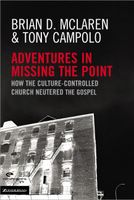Remy: Welcome back for our last show where we are talking about why people don't attend church. Christine Ruth has joined me once again. Welcome, Christine.
Christine: Thanks Remy. I've enjoyed being here this week. Remy, I told you my story yesterday about why I quit going to church and explored Buddhism. What's your story?
Remy: I actually quit going to church twice. The first time was when most people quit going to church, right after confirmation! Confirmation seems to be the church equivalent to graduation. We take our classes, graduate and then move on to bigger and better things - at least that's what we think. At the time, church made no sense. God wasn't personal to me or my family, so it was a family decision.
Christine: Okay, that's one. What was the second time?
Remy; the second time was after I became a Christian and been in church for about twelve years. The church I was a part of went through a split. It really disillusioned me. I tried going back to church because I believe in the church but I could barely sit through a service. I felt sick inside.
Christine: Why was that?
Remy: Well, I gave that a lot of thought. It just all seemed so hollow. So fake. Everything being said was just words to me. I was really devastated. I had invested a lot of my life in the church and I felt betrayed. I didn't lose my faith in God but I lost a lot of faith in church people and the church as an institution. Every few months I'd try to go to church but the feeling didn't change. That went on for five years until I was finally able to settle back into the life of a church.
Christine: So Remy, after your experience and all that we've talked about this week, what's your conclusion? What is the bottome line? What do you think will bring people back to church?
Remy: Christine, I really believe that when the church preaches the good news – the news that God accepts us unconditionally and empowers us to live a new life – a transformed life - then people will come. Everyone on the planet is looking for acceptance and the power to live a transformed life. We've got the news that everyone wants to hear. When we learn how to not only proclaim it, but proclaim it in the language and the method that people can hear, then we won't have to worry about people attending church. They'll be lining up to get in.



